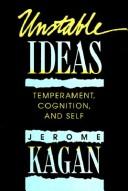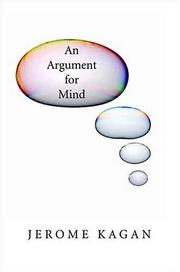| Listing 1 - 10 of 98 | << page >> |
Sort by
|
Book
ISBN: 9780521732307 9780521518420 9780511576638 0511576633 9780511518003 0511518005 9780511516856 0511516851 0521518423 0521732301 1107191653 051151557X 0511514468 9781107191655 9780511514463 Year: 2009 Publisher: New York Cambridge university press
Abstract | Keywords | Export | Availability | Bookmark
 Loading...
Loading...Choose an application
- Reference Manager
- EndNote
- RefWorks (Direct export to RefWorks)
In 1959 C. P. Snow delivered his now-famous Rede Lecture, 'The Two Cultures,' a reflection on the academy based on the premise that intellectual life was divided into two cultures: the arts and humanities on one side and science on the other. Since then, a third culture, generally termed 'social science' and comprised of fields such as sociology, political science, economics, and psychology, has emerged. Jerome Kagan's book describes the assumptions, vocabulary, and contributions of each of these cultures and argues that the meanings of many of the concepts used by each culture are unique to it and do not apply to the others because the source of evidence for the term is special. The text summarizes the contributions of the social sciences and humanities to our understanding of human nature and questions the popular belief that biological processes are the main determinant of variation in human behavior.
Philosophy and psychology of culture --- Biology --- Social sciences --- Humanities --- Science --- History --- 316.728 --- Cultuur. Levenswijze --- 316.728 Cultuur. Levenswijze --- Behavioral sciences --- Human sciences --- Sciences, Social --- Social science --- Social studies --- Civilization --- Natural science --- Science of science --- Sciences --- Learning and scholarship --- Classical education --- Life sciences --- Biomass --- Life (Biology) --- Natural history --- Natural sciences --- Health Sciences --- Psychiatry & Psychology --- Biology - History - 21st century --- Social sciences - History - 21st century --- Humanities - History - 21st century --- Science - History - 21st century

ISBN: 067493038X Year: 1989 Publisher: Cambridge, Mass. Harvard University Press
Abstract | Keywords | Export | Availability | Bookmark
 Loading...
Loading...Choose an application
- Reference Manager
- EndNote
- RefWorks (Direct export to RefWorks)
Cognitive psychology --- Developmental psychology --- Cognition in children. --- Developmental psychology. --- Self. --- Temperament in children. --- Cognition. --- Human Development. --- Personality. --- Self Concept.
Book
ISBN: 0155928732 9780155928732 Year: 1971 Publisher: New York (N.Y.): Harcourt, Brace and Jovanovich
Abstract | Keywords | Export | Availability | Bookmark
 Loading...
Loading...Choose an application
- Reference Manager
- EndNote
- RefWorks (Direct export to RefWorks)
Child Behavior --- Child Psychology --- Child psychology --- Motivation (Psychology) --- Cognition in children --- Educational psychology --- Enfants --- Motivation (Psychologie) --- Cognition chez l'enfant --- Psychopédagogie --- Psychologie --- Motivation (Psychology) in children --- Child psychology. --- Education --- Psychology, Educational --- Psychology --- Cognition (Child psychology) --- Thought and thinking in children --- Behavior, Child --- Child behavior --- Child study --- Children --- Pediatric psychology --- Psychology, Child --- Child development --- Developmental psychology --- Child psychiatry --- Child rearing --- Cognition in children. --- Educational psychology. --- Motivation (Psychology) in children. --- Psychology, Child. --- Psychopédagogie --- Child Behavior.
Book
ISBN: 2738108946 9782738108944 Year: 2000 Publisher: Paris : Odile Jacob,
Abstract | Keywords | Export | Availability | Bookmark
 Loading...
Loading...Choose an application
- Reference Manager
- EndNote
- RefWorks (Direct export to RefWorks)
Tout est-il joué dès l'âge de trois ans ? Être intelligent, qu'est-ce que cela veut dire ? Le sens moral n'est-il que le produit de conventions ou bien est-ce le résultat de l'évolution ? Tous ces thèmes font l'objet de controverses parfois féroces. Voici les vues décapantes d'un des plus grands spécialistes mondiaux du développement. Son but : expliquer le fonctionnement psychologique du tout-petit pour aider les parents à mieux élever leurs enfants.
Psychology --- Psychology, Child --- Personality Development --- Moral Development
Book
ISBN: 0855277653 Year: 1979 Publisher: Hassocks Harvester press
Abstract | Keywords | Export | Availability | Bookmark
 Loading...
Loading...Choose an application
- Reference Manager
- EndNote
- RefWorks (Direct export to RefWorks)
159.922.7 --- Kinderpsychologie --- 159.922.7 Kinderpsychologie
Book
ISBN: 9780300178685 0300178689 Year: 2012 Publisher: New Haven (Conn.) Yale University Press
Abstract | Keywords | Export | Availability | Bookmark
 Loading...
Loading...Choose an application
- Reference Manager
- EndNote
- RefWorks (Direct export to RefWorks)
Psychoanalysis. --- Mental illness. --- Psychology, Pathological.
Book
ISBN: 0262036525 0262341344 9780262341349 9780262341356 0262341352 9780262036528 Year: 2017 Publisher: Cambridge, MA : MIT Press,
Abstract | Keywords | Export | Availability | Bookmark
 Loading...
Loading...Choose an application
- Reference Manager
- EndNote
- RefWorks (Direct export to RefWorks)
A distinguished psychologist considers five conditions that constrain inferences about the relation between brain activity and psychological processes.
Human behavior. --- Psychology. --- Neuropsychology. --- COGNITIVE SCIENCES/Psychology/Cognitive Psychology --- Neurophysiology --- Psychophysiology --- Behavioral sciences --- Mental philosophy --- Mind --- Science, Mental --- Human biology --- Philosophy --- Soul --- Mental health --- Action, Human --- Behavior, Human --- Ethology --- Human action --- Human beings --- Physical anthropology --- Psychology --- Social sciences --- Psychology, Comparative --- Behavior
Book
ISBN: 9780262042932 9780262355049 0262355043 0262042932 0262355051 Year: 2019 Publisher: Cambridge, Mass. The MIT Press
Abstract | Keywords | Export | Availability | Bookmark
 Loading...
Loading...Choose an application
- Reference Manager
- EndNote
- RefWorks (Direct export to RefWorks)
An argument that the meaning of a psychological or biological measure depends on the age, gender class, and ethnicity of the human subject.
Social psychology --- Political philosophy. Social philosophy --- Developmental psychology --- Life change events --- Life cycle, Human --- Social classes --- Ethnicity --- Gender --- Social psychology. --- Psychological aspects. --- Mass psychology --- Psychology, Social --- Human ecology --- Psychology --- Social groups --- Sociology --- Ethnic identity --- Group identity --- Cultural fusion --- Multiculturalism --- Cultural pluralism --- Class distinction --- Classes, Social --- Rank --- Caste --- Estates (Social orders) --- Social status --- Class consciousness --- Classism --- Social stratification --- COGNITIVE SCIENCES/Psychology/General --- SOCIAL SCIENCES/General --- PSYCHOLOGY / Movements / Behaviorism --- PHILOSOPHY / Epistemology

ISBN: 1281730149 9786611730147 0300129335 9780300129335 9780300113372 0300113374 9781281730145 Year: 2006 Publisher: New Haven (Conn.) Yale university press
Abstract | Keywords | Export | Availability | Bookmark
 Loading...
Loading...Choose an application
- Reference Manager
- EndNote
- RefWorks (Direct export to RefWorks)
In this elegantly written book, Jerome Kagan melds the history of the field of psychology during the past 50 years with the story of his own research efforts of the same period and an analysis of what he terms "the currently rocky romance between psychology and biology." As Kagan unwinds his own history, he reveals the seminal events that have shaped his career and discusses how his assumptions have changed. With full appreciation for the contributions to psychology of history, philosophy, literature, and neuroscience, he approaches a wide range of fascinating topics, including:· the abandonment of orthodox forms of behaviorism and psychoanalysis· the forces that inspired later-twentieth-century curiosity about young children· why B. F. Skinner chose to study psychology· why the study of science less often ignites imaginations today· our society's obsession with erotic love· the resurgence of religious fanaticism and the religious RightEmbedded in Kagan's discussions is a rejection of the current notion that a mature neuroscience will eventually replace psychology. He argues that a complete understanding of brain is not synonymous with a full explanation of mind, and he concludes with a brief prediction of the next five decades in the field of psychology.
Psychology --- History
Book
ISBN: 1280062282 9786613519948 0300184913 9780300184914 9780300178685 0300178689 9781280062285 Year: 2012 Publisher: New Haven : Yale University Press,
Abstract | Keywords | Export | Availability | Bookmark
 Loading...
Loading...Choose an application
- Reference Manager
- EndNote
- RefWorks (Direct export to RefWorks)
This book is the product of years of thought and a profound concern for the state of contemporary psychology. Jerome Kagan, a theorist and leading researcher, examines popular practices and assumptions held by many psychologists. He uncovers a variety of problems that, troublingly, are largely ignored by investigators and clinicians. Yet solutions are available, Kagan maintains, and his reasoned suggestions point the way to a better understanding of the mind and mental illness.Kagan identifies four problems in contemporary psychology: the indifference to the setting in which observations are gathered, including the age, class, and cultural background of participants and the procedure that provides the evidence (he questions, for example, the assumption that similar verbal reports of well-being reflect similar psychological states); the habit of basing inferences on single measures rather than patterns of measures (even though every action, reply, or biological response can result from more than one set of conditions); the defining of mental illnesses by symptoms independent of their origin; and the treatment of mental disorders with drugs and forms of psychotherapy that are nonspecific to the diagnosed illness. The author's candid discussion will inspire the debate that is needed in a discipline seeking to fulfill its promises.
Mental illness. --- Psychoanalysis. --- Psychology, Pathological. --- Abnormal psychology --- Diseases, Mental --- Mental diseases --- Mental disorders --- Pathological psychology --- Psychology, Abnormal --- Psychopathology --- Neurology --- Brain --- Criminal psychology --- Mental health --- Psychiatry --- Psychoanalysis --- Psychology --- Psychology, Pathological --- Madness --- Disabilities --- Diseases
| Listing 1 - 10 of 98 | << page >> |
Sort by
|

 Search
Search Feedback
Feedback About UniCat
About UniCat  Help
Help News
News